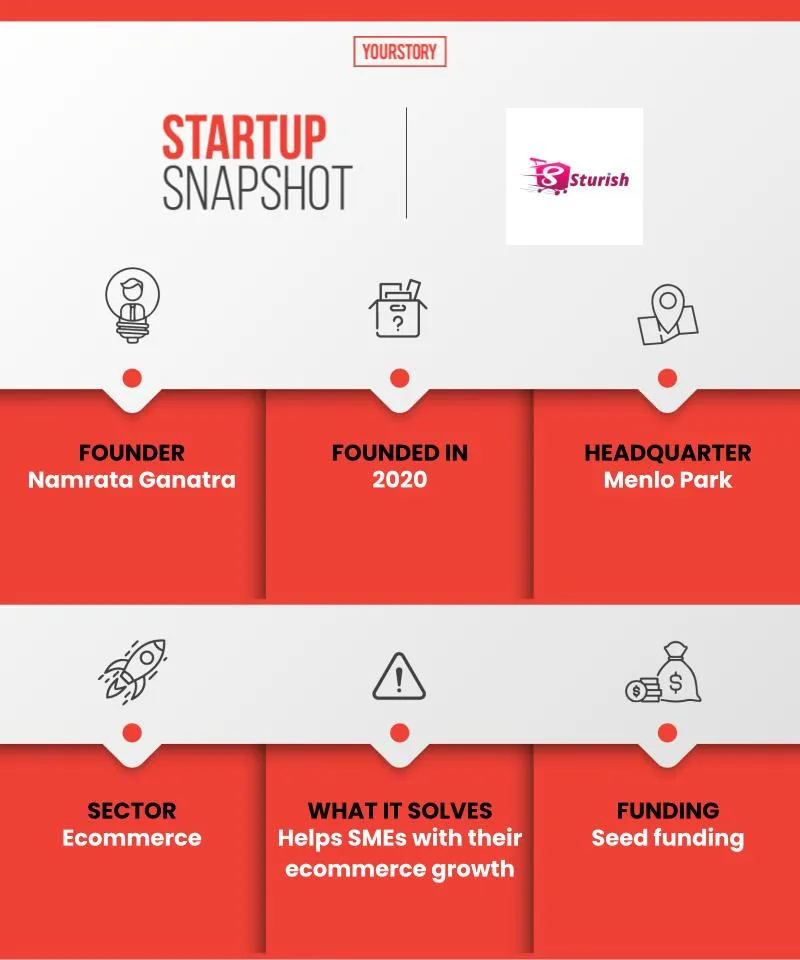As the former CTO of Silicon Valley-based Lambda School, Namrata Ganatra has worked with top companies like Facebook and PayPal, and built core technologies at Microsoft. She was running tech for a small startup called Zong, which was later acquired by Paypal.
But Namrata always wanted to do something on her own, and the coronavirus pandemic proved to be the right time for her to start up again. Namrata started Sturish, an AI-driven ecommerce growth platform, in October 2020. The platform takes care of setting up the ecommerce business for any seller through complete automation.
“In March 2020, we had started working from home, and I realised I was saving three hours of commute from Menlo Park to San Francisco where Lambda School was based. At this time, I was itching to learn about a new space and I started a side business of ecommerce – selling educational toys on online marketplaces in the US,” says Namrata.
The startup has already raised seed funding of $3.2 million led by Neo, Act One Ventures, and Fika Ventures.

Core team of Sturish
A side project to a business
The idea of ecommerce had always intrigued Namrata as she has been interested in the sector since her Facebook days. But what she noticed was that there wasn’t much time or resources available to learn about product customisation and listing optimisations across marketplaces. She found some gaps, which led her to start Sturish. Namrata explains,
“Since it was a part-time hobby project, I also didn’t want to spend a lot of time in marketing. That is where I got thinking of different ideas of omni-channel expansion and AI-based ad optimisation. I would wonder how I could use technology to do keyword intelligence and optimisation. Then I realised this was easy for me, as I have a technical background, but a lot of small businesses struggle with the ecommerce and digital boom.”
This led her to build a platform that small businesses with no tech background can use to create a level-playing field in ecommerce. “They don’t have to fight the giants for ad dollars to create growth. No small business has over $3,000 or $4,000 ad spends a month to grow their sales.”

Sturish Dashboard
How does it work?
Businesses can sign up on Sturish, upload their products, and select the marketplaces they want to sell on. The platform then automatically creates product listings, and the team takes photos and videos of the products if there are no good ones.
“Product listings in the ecommerce world converts to sales only when there are good pictures and videos. Many small businesses don’t have that expertise. We also do the keyword optimisation for the listings and help them with organic traffic,” says Namrata.
These listings are then distributed across multiple ecommerce platforms like Amazon, Walmart, eBay, etc. Based on the daily performance of the data on what’s selling, what are some of the clicks, and the conversion on the products, the listings, and ad campaigns are automatically optimised.
Sturish works on an Income Share Agreement (ISA) model. “We don’t charge businesses for setting up and growing their sales. We take a small percentage of the cut only when our customers’ product sells. If the products don’t sell, all the work done on optimisations is on us. We want our incentives to be aligned with our customers’ incentives to grow sales,” adds Namrata.
While primarily focussed on the US market, Sturish has an international expansion programme for sellers based out of India. She says they are partnering with small brands in India to help them grow in the US.
“What we found is that reaching international markets remains extremely difficult for Indian ecommerce entrepreneurs. We are looking to change this by simplifying the ecommerce stack, multi-channel expansion, and marketing. Sturish is hoping to really unlock a wave of value for these businesses as they maximise sales in foreign markets,” adds Namrata.

The market
According to several media reports, India is home to over 63 million micro, small and medium enterprises (MSMEs), many of whom had to pivot to new business models to survive the coronavirus pandemic.
At present, the startup competes with the likes of Shopify, which helps small merchants start, run, market, and grow their business, powers over one million businesses in 175 countries. Other startups like Baaz are focussed on helping companies with their video commerce platforms.
Namrata, however, believes Sturish’s main focus is to help users grow. Most of its team members comprise of those whom Namrata worked with earlier.
Speaking of their investment in Sturish, TX Zhuo, General Partner, Fika Ventures, says, “I knew Namrata as a technologist and as a friend, and would brainstorm on multiple ideas. Also, the space was very interesting. There are many online sellers who run personal businesses, and more than 90 percent of Amazon sellers actually make less than $100,000 a year. There is a rising tide of new sellers but there is no support mechanism for them.”
He adds the focus on digital will be stronger in the coming months. He says international barriers are breaking and sellers in every country are looking at larger markets. Platforms like Sturish will allow sellers to access the US market, said Zhuo.
“Sturish’s mission of empowering small businesses to compete with giants is near and dear to my heart. We’re delighted to back Sturish and to support Namrata’s journey from a technical leader and executive to startup founder,” said Ali Partovi, CEO of Neo on investing in Sturish.
Namrata says the team is now looking at deeper penetration and plans to add more product updates.










![Read more about the article [Funding alert] HRtech and AI startup Hyreo raises Pre-Series A round](https://blog.digitalsevaa.com/wp-content/uploads/2021/06/investment-1618121233003-1623648563540-300x150.png)